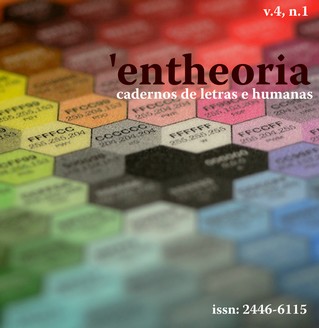The hour and turn in Guimarães Rosa’s short story A hora e a vez de augusto matraga [The hour and turn of augusto matraga]
Keywords:
Popular Catholicism, Jagunçagem [Gunmen], Sagarana, Philosophical reflectionAbstract
This study aims to establish a study about the short story A hora e a vez de Augusto Matraga [The Hour and Turn of Augusto Matraga] seeking a discussion on how Guimarães Rosa recreated the Brazilian view on popular Catholicism by reinventing the philosophical relationship between man and religion. For this, it is observed the existential development from the protagonist who starts as Nho Nunes, whose status is of a violent and impetuous man, and reaches a new condition as Augusto Matraga, whose personality is of a religious and resigned person. Hence, this article focuses on analyzing how the protagonist will gradually disengaging from Northeastern honor codes to incorporate a universal philosophical stance on the relationship between life and death in human history. This article is based upon the reflection on the popular belief that the time of death may be "the hour and turn" of redemption for a man, which is addressed as the climax of the story and renewal of the character. Therefore, it intends to verify the protagonist’s trajectory of existential transformation, from his pre-death until its actual occurrence. This allows the understanding of how Guimarães Rosa’s prose moves from a local discussion to a global one, when it approaches human fears and yearnings.Downloads
References
ALCORÃO SAGRADO. Tradução: Samir El Hayek. São Paulo: Expansão Editorial, 1975.
BÍBLIA. Português. Bíblia Sagrada. Tradução de Padre Antônio Pereira de Figueredo. Rio de Janeiro: Encyclopaedia Britannica, 1980. Edição Ecumênica.
BLASTIC, Michael. (2007). Prayer in the Writings of Francis. In: Johnson, T. J. Franciscans at Prayer. Vol. 4. Brill.
CANDIDO, Antonio. No grande sertão - 1956. In: _____. Textos de intervenção. São Paulo: Editora 34, 2002.
GAJANO, S. B. Santidade. In: LE GOFF, Jacques; SCHMITT, Jean-Claude (Coord.). Dicionário Temático do Ocidente Medieval. Bauru: Edusc, v. 2, p.449-463.
HOBSBAWM, Eric. Bandidos. São Paulo: Ed Paz e Terra, 2010.
GARCÍA MORENTE, Manuel Fundamentos de Filosofia. 8ª Edição. São Paulo: Editora Mestre Jou, 1980.
NUNES, Benedito. A Rosa que é de Rosa: literatura e filosofia. Rio de Janeiro: Organização Victor Sales Pinheiro, 2010.
REIS, João José. A morte é uma festa: ritos fúnebres e revolta popular no Brasil do século XX. São Paulo: Cia. das Letras, 1991.
_____. O cotidiano da morte no Brasil Oitocentista. In: ALENCASTRO, Luiz Felipe (Org). História da Vida Privada no Brasil. São Paulo: Companhia das Letras, Vol. 1, p. 96-141, 1997.
ROSA, Guimarães. Sagarana. São Paulo: Editora Record, 1984.
MELLO E SOUZA, Laura. O diabo e a terra de Santa Cruz: feitiçaria e religiosidade popular. São Paulo: Companhia das Letras, 1986.
TAVARES, Thiago Rodrigues. Um ritual de passagem: o processo histórico do “bem morrer”. Revista Brasileira de História das Religiões. ANPUH: Maringá-PR, Ano II, n. 4, maio 2009.
VASCONCELOS, Sandra Guardini T. Homens provisórios: coronelismo e jagunçagem em Grande Sertão: Veredas. Scripta, Belo Horizonte, v. 5, n. 10, p. 321-333, 2002.
Downloads
Published
How to Cite
Issue
Section
License
Copyright (c) 2017 Entheoria: Cadernos de Letras e Humanas ISSN 2446-6115

This work is licensed under a Creative Commons Attribution 4.0 International License.
O(s) Autor (es), na qualidade de titular (es) do direito de autor do ensaio ou artigo submetido à publicação, de acordo com a Lei nº. 9610/98, concorda (m) em ceder os direitos de publicação à Revista Entheoria e autoriza(m) que seja divulgado gratuitamente, sem ressarcimento dos direitos autorais, por meio do Portal de Revistas Eletrônicas da UFRPE e sites associados, para fins de leitura, impressão e/ou download pela Internet, a partir da data da aceitação do artigo pelo Conselho Editorial da Revista. É vedada a submissão integral ou parcial do manuscrito a qualquer outro periódico.

























